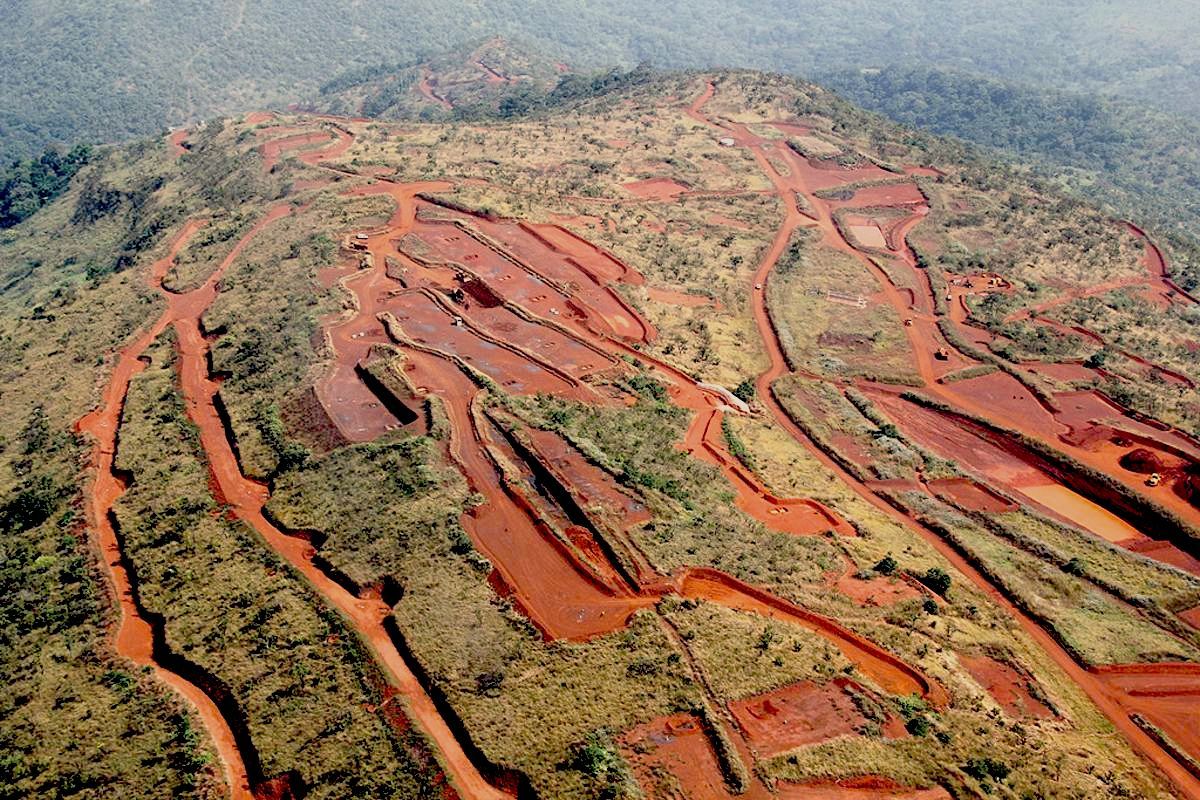Rio Tinto to Cooperate with Chinese Firms on Railway to Transport Iron Ore in Guniea

The Lede: The Anglo-Australian mining giant Rio Tinto and a consortium of Chinese state-owned enterprises announced on Friday that they had reached key agreements with the Guinean government to build a trans-Guinean railway that will be capable of moving iron ore from the inland Simandou mountain range to the country’s coast.
What We Know:
- The 600 km long railway, which will involve the construction of 235 bridges and a tunnel expected to be over 11 km long, would weave through the mountainous Guinean terrain and arrive at a prospective deep sea port, This would avoid cutting through nearby Liberia or Sierra Leone to access the coast.
- China has stakes in all four of the blocks that Simandou has been divided into. Blocks 1 and 2 in the north are held by the Guinean government and a consortium between the Singapore-based Winning International Group with Weiqiao Aluminium of China. Blocks 3 and 4 in the south are held by the Guinean government, Rio Tinto, and a group of leading Chinese state-owned enterprises including the Aluminum Corporation of China (Chinalco), steelmaker China Baowu, the China Rail Construction Corporation, and the China Harbour Engineering Company. The cost of the railway will be shared equally between the groups developing each of the four blocks.
The Background: China relies heavily on Australia for iron ore, importing 69% of its supply from the country in 2022. Iron ore is a key ingredient for steelmaking, which serves for general economic development, but also for the construction of military ships and submarines. Guinea is expected to become the world's third-largest exporter of iron ore, which would put a dent in Australia’s dominance. China and Australia have been slowly repairing bilateral ties that were damaged when the latter called for an international investigation into the root of COVID-19. China has eliminated duties on imported Australian barley after three years while Australia responded by pledging to suspend its case at the World Trade Organization on the issue. Australia has also extended an invitation to China's Foreign Minister Wang Yi.
Likely Outcomes:
- Even though this deal works in conjunction with an Anglo-Australian company, this move can be seen as one that China has taken to ‘de-risk’ from Australia with the rise of tensions and economic barriers with the West. China will likely act on the friendly relations that it has fostered in many Global South countries in recent years, especially those in Africa, and lean more into exploring resource potential through this kind of investment cooperation.
- The U.S. and its allies must consider the ways in which China will ‘de-risk’ its own economic ties to counter the Western-led ‘de-risking’ efforts, especially as many Global South countries have underdeveloped resources that they have no problem cooperating with China on capitalizing on. In Africa, the U.S. has lagged behind China on development and cooperation with some Biden administration officials just recently making state visits. From this perspective, China will continue to have the upper hand in opportunities in the continent for the foreseeable future.
Quotables:
"With these agreements we have reached an important milestone towards full sanction of the Simandou project, bringing together the complementary strengths and expertise of Rio Tinto and our partners, the Government of Guinea and Winning Consortium Simandou, for the infrastructure that will unlock this world class resource. Simandou, the world’s largest known undeveloped supply of high-grade, low-impurity iron ore, will strengthen Rio Tinto’s portfolio by complementing our existing Pilbara and Iron Ore Company of Canada products.” – Bold Baatar, Rio Tinto Executive Committee lead for Guinea and Copper Chief Executive
“[Guinea’s iron ore] might be best for small but super-high-quality manufacturing, the sort of material Germany would want, not for huge bridges and buildings. It fits China's 'high-quality development' phase. The other factor that is maybe easily missed is the new Chinese-built mega port outside of Lagos. I suspect they will load the iron ore onto smaller ships in Conakry and take those to Nigeria, where much of it will be re-loaded onto mega ships to East Asia. Quality makes up for the distance." – Lauren Johnston, associate professor at Sydney University China Studies Centre
“Simandou is unprecedented for Guinea not only in its size and complexity, but the threats it poses to the rights and environment of local communities. Inadequate oversight of the project could result in a human rights and environmental disaster. Despite Rio Tinto and the Winning consortium’s promise to respect human rights, their history in Guinea raises major questions about their capacity to deliver. Guinean communities are yet to see whether the companies’ commitments will translate into meaningful protections for their land, environment, and rights.” – Jim Wormington, senior corporate accountability researcher and advocate at Human Rights Watch
Good Reads:
China bankrolls Africa railroad to cut Australia iron-ore reliance (Nikkei)
Agreements reached on trans-Guinean infrastructure in milestone for Simandou iron ore project (Business Wire)
Simandou project reaches key milestone (Australian Mining)
Guinea: Ensure Respect for Rights in Massive Iron Ore Project (Human Rights Watch)
